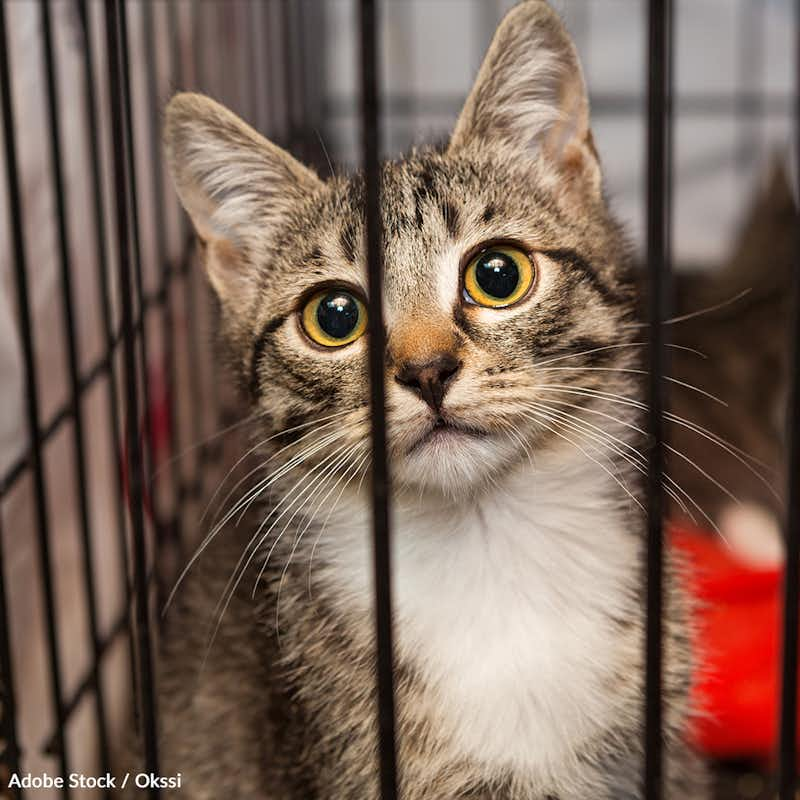Give Shelter Cats The Comfort They Deserve
16,794 signatures toward our 30,000 Goal
Sponsor: The Animal Rescue Site
Shelter cats are more likely to be passed over for adoption because they feel uncomfortable. Pledge to comfort shelter cats!

In most shelters, cats live in small, easy-to-clean stainless-steel cages with a metal gate as the entry, a small litter pan, food, water, and a towel or blanket. This meets the most basic of physical needs, but in no way meets behavioral or emotional needs to keep a cat healthy and satisfied.
Cat housing can be a serious problem in shelters. Traditional 2-foot by 2-foot cages are far too restrictive to house cats comfortably, and frequently result in highly stressed animals1.
Most shelters keep cats in stainless steel kennels which, although sanitary, do not hold a natural scent and provide no place to scratch unless blankets or scratching posts are added. Removing a cat from a cage to clean it and then returning the animal to fully sanitized surroundings can be disorienting, and doing it too often can cause cats stress2.
Integrating less intensive or less frequent sanitization procedures into a cat's routine, without removing them from the kennel, supports a more predictable series of events that make the cleaning much less scary, and possibly even rewarding for the animal3.
Cats also have a tendency to get depressed in cages. Cats prefer to look out windows. They like human contact, socializing with other cats and access to points of view that let them see they are safe from danger4.
When cats are given enough time to play and understand the other animals and people in their surroundings, they will build confidence and feel more comfortable.
Felines instinctually crave hideaways. Of course, it's common knowledge to cat owners everywhere that boxes make the perfect solution5.
“In a shelter environment, it is clearly impractical to allow a cat to either run away or climb high. But it is feasible to give them somewhere to hide," said Dr. Rachel Casey, author of the first study, which took place in 2007 at the University of Bristol. "Some shelters were already giving particularly nervous cats a hiding place, but it was not a universally accepted practice6.”
“Stressful experiences can have major impact on the cats’ welfare,” Casey said, “and may cause higher incidences of infectious diseases in the shelters due to raised cortisol levels causing immunodeficiency.”
Scientific study has also shown that petting, brushing and playing with shelter cats reduces their stress and helps with their socialization. Kittens exposed to this kind of gentle treatment are overall happier and face a lower risk of of upper-respiratory infections (URIs) than those who are neglected7.
Like most animals, cats need interaction and stimulation to help manage stress and keep them happy. Cats enjoy being groomed, they are affectionate animals and need opportunities to use up their energy, even when they’re in their cages8.
Helping your local shelter apply even just one of these ideas will improve the comfort of cats. Take the Comfortable Cat Pledge and help cats find solace in shelters until they can be matched with a caring human and a loving home!
- Jessica Hekman, DVM, MS, The IAABC Journal (2022), "Housing Cats in Shelters."
- Ingrid King, The Conscious Cat (1 November 2022), "How Cats Communicate Through Marking Behavior."
- Best Friends Animal Society (2022), "Enrichment for Shelter Cats."
- T.J. Banks, Petful (19 December 2016), "Why Cats Need a Gentler Hand in Shelters."
- Feline Behavior Solutions (2022), "Cats Love Hiding – Indulge Them!."
- Kristina Kry, Rachel A. Casey, Animal Welfare (August 2007), "The effect of hiding enrichment on stress levels and behaviour of domestic cats (Felis sylvestris catus) in a shelter setting and the implications for adoption …."
- Nadine Gourkow, Clive J C Phillips, Preventive Veterinary Medicine (1 October 2015), "Effect of interactions with humans on behaviour, mucosal immunity and upper respiratory disease of shelter cats rated as contented on arrival."
- Alley Cat Allies. (2022), "The Cat Socialization Continuum: A Guide to Interactions Between Cats and Humans."
The Pledge:
As an advocate for the humane treatment of all cats until they can be adopted into loving forever homes, I pledge my support to shelters across the United States that do the constant work of saving felines from homelessness and death.
I pledge to support cat shelters and keep cats comfortable by accomplishing one or more of the following:
- Donating or purchasing comfort items for shelter cats to use
- Fostering a shelter pet until they can find a new forever home
- Volunteering at a local shelter
- Sharing the importance of adopting cats from a shelter with my friends and loved ones on social media and in person.
Pledged by,